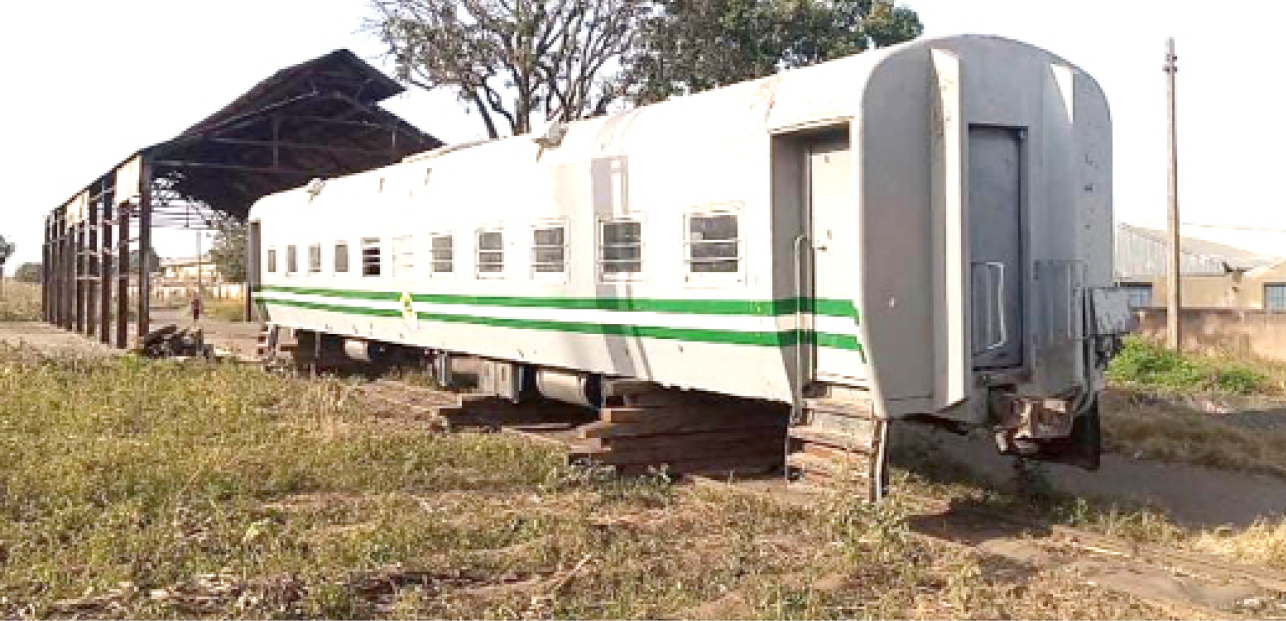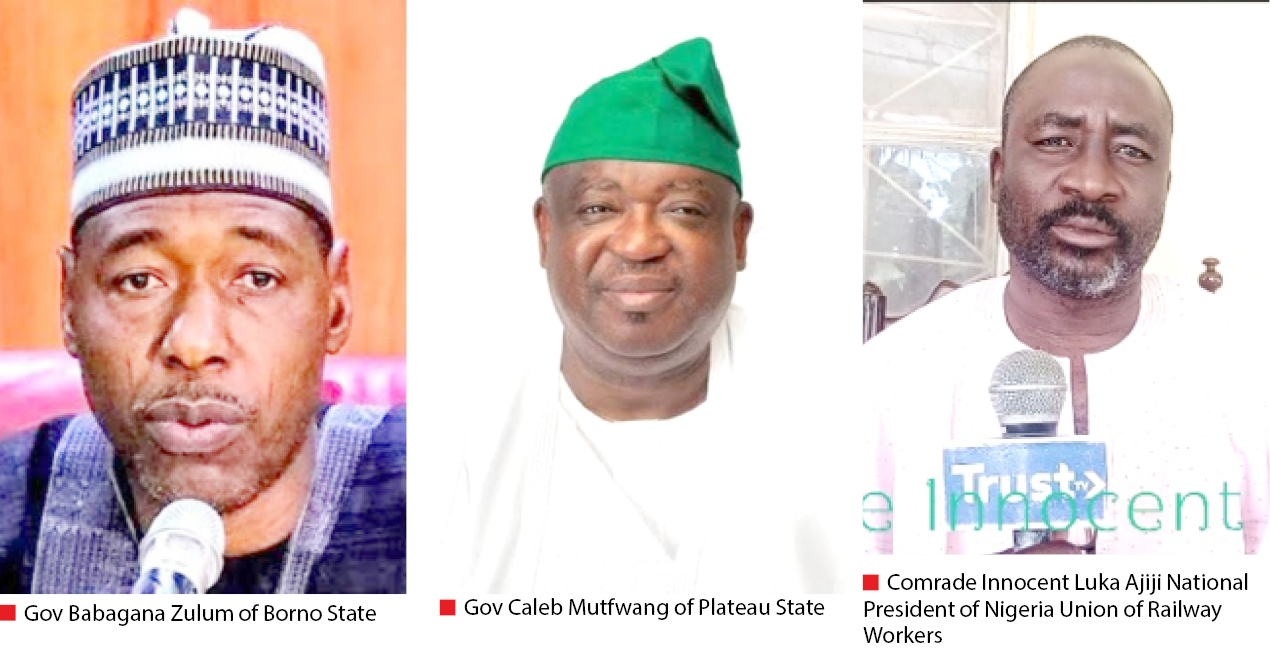Real reason NRC relocated train coaches from Maiduguri to Jos
Dust is yet to settle over the controversy surrounding the relocation of train coaches from Maiduguri, the Borno State capital, by staff of the Nigerian Railway Corporation (NRC), to Jos, Plateau State. Amidst growing tensions between the Borno State Government and the NRC over an attempt to move about 11 coaches out of the state, […]

one of the train coaches brought to Jos from Maiduguri as well as the railway tracks in Jos
Dust is yet to settle over the controversy surrounding the relocation of train coaches from Maiduguri, the Borno State capital, by staff of the Nigerian Railway Corporation (NRC), to Jos, Plateau State. Amidst growing tensions between the Borno State Government and the NRC over an attempt to move about 11 coaches out of the state, Daily Trust Saturday gathered that only one coach has arrived at the NRC running shed in Jos, where repairs are expected to take place.
Recall that drama unfolded on Saturday, Oct 14, when locals spotted five trucks being loaded with coaches in Maiduguri, which had been separated from their wheels. The incident escalated, resulting in police involvement and shots fired at the truck wheels, forcing the drivers, accused of theft, to run for their dear lives. About six of the NRC personnel were arrested and detained.
The Borno State governor, Babagana Zulum, had stopped the movement of the coaches from the state, describing the action of the NRC as “suspicious and unfair,” adding that the state government was not informed about the move until residents intercepted the train coaches and arrested NRC officials.
The NRC had, however, stressed that an official letter was communicated to security agencies in the state regarding the evacuation of the coaches by its officials for onward repairs in Jos. It stated that after the repairs, the coaches were to be deployed to other “areas of need.”
- EFCC quizzes Emefiele after regaining freedom from DSS detention
- Life returns to Borno night market sacked by insurgents

The railway corporation had insisted that the expertise required to refurbish the rolling stocks was not available in Maiduguri.
However, Daily Trust Saturday reports that the attempt to move all 11 coaches from Maiduguri was connected to a recent deal entered between the NRC and the Plateau State Government to revitalise and commence railway transportation in the state.
Sources familiar with the development explained that the coaches being moved to Jos were not for refurbishment alone but to also be put to use in the state. “Therefore, Plateau State became the immediate area of need for the coaches being moved out of Maiduguri,” a source told our reporter, adding that other coaches would be deployed to other states after the repairs are completed.
He said that because the coaches were abandoned in Maiduguri, the NRC decided to take them to Jos and repair to commence operation in fulfillment of a pact it entered with the Plateau State Government.
“The coaches in Maiduguri are said to be abandoned for over 20 years now due to vandalism and the activities of insurgents,” he said.
Daily Trust Saturday visited the locomotive shed situated at the Terminus station at the city of Jos. The shed is just about 400 metres away from the NRC office building, off Lugard Road. It was observed that the shed, where the NRC said it could provide the expertise for the repairs of the coaches, is an open space, which is also unfenced.
Our correspondent found that a single coach was visible but no repair work had commenced on the coach. It was also noticed that the coach was standing on a rail track, near a pavilion and supported by wooden planks.
Daily Trust Saturday also noticed an armed policeman stationed at the open shed to deter vandals, while passersby were seen freely crossing through the unfenced shed to reach various part of the city.
A source at the station said the repairs would be done at the shed, adding that every train station has a repair shed where train repairs are done from time to time. According to the source, the Jos shed is as old as the station itself, and repairs were often done by NRC engineers until the rail line sector went comatose. He said most train repairs around the northern region were done in Kafanchan, Kaduna State.
Probing what prompted the relocation of the rolling stocks from Maiduguri to Jos, it was gathered that this was due to an agreement entered between the Plateau State Government and the NRC to revitalise the railway system and commence transportation operation in the state.
The NRC in Plateau State further confirmed that upon assumption of office, Governor Caleb Mutfwang decided to revive railway transportation, which is expected to cover key locations within Jos North and Jos South.
The national president of the Nigeria Union of Railway Workers, Comrade Innocent Luka Ajiji, told our correspondent that the coaches to be relocated from Borno were meant to be put to use in Plateau State.
“The situation right now is that the railway management has written to the Borno State Government to release our coaches so that they can be conveyed to Jos to run the train services the Plateau State government requested,” he said.
He said the railway management had the intention to run mass transit nationwide, adding, “If these coaches come to Jos, they will be refurbished, while those needed in other locations would be picked from the refurbished ones and taken to other locations.”
Comrade Ajiji, said the government of Borno State had no right over railway facilities as they are purely federal government facilities.
“We have the right and power to run our trains the way we want, and we have the right to move our facilities from one location to another,” he said.
Ajiji said that holding unto the coaches without utilisation would do Borno State no good, adding that it is the same railway corporation that would run train services for the state when Borno is ready to do so.
Speaking on the capabilities of the running shed in Jos, Ajiji said they had departments of mechanical engineering and electrical, adding that the personnel of those departments were in charge of repairs and had the expertise to fix the coaches. He said the experts were already in Jos as the NRC does not contract their repairs to outsiders.
“To refurbish locomotives and coaches is not easy as people think. There is no school that will give that experience in Nigeria. You first have to be employed by the railway, then we send you to our technical and training schools before you can even know how to do it,” he added.
However, the delay in the arrival of the other coaches has come as a setback for the Plateau State Government’s agreement with the NRC. The Commissioner for Transportation in the state, Jatau Davou Gyang, said the state government made a pact with the NRC and not with any state in mind.
“Let me stress that our own deal was with the railway corporation and not with any state in mind, or that the corporation should go to any state to get the coaches for Plateau. Our pact is between us and the NRC, and they know where their facilities are across the country to be put into use where in need,” the commissioner said.
Gyang explained that the state government’s agreement with the NRC was to revamp the railway system in the state, which would be done in three phases, including intra-state and inter-state.
“The first phase will include the train shuttling Terminus station in Jos to Kuru, while the second phase is among local government areas. The third phase is from the state and others in the country. Currently, the tracks in Plateau are being fixed,” he said.
When contacted, a senior special assistant to Governor Babagana Zulum of Borno State, Baba Sheikh, told Daily Trust Saturday that the governor maintained his position that the recent attempt to relocate the railway coaches from Borno to other parts of Nigeria was done in a suspicious and unfair manner. He said nobody would move any of the rail infrastructures in Borno State out without recourse to the rule of law.
Sheikh also quoted the governor as saying that with recent developments where the management of railway was removed from the exclusive list of the federal government, Borno State will explore a means of partnership with the NRC to make proper use of railway infrastructure.
